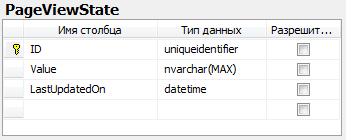Farewell to ViewState - 2, or to the base of it!
Another round of tough confrontation with ViewState. This time we will try to save it in the SQL Server database.
We repeat the theory a little. We have a PageAdapter class , the use of which can “adapt” an aspx page to a specific browser (in our case, to everyone). Using this adapter, you can override the functionality for loading and saving ViewState (using the GetStatePersister method ).
So, the procedure:
- create a simple structure in the database for storing ViewState: We also create stored procedures for receiving, saving and cleaning (obsolete) ViewState; - inherit the PageStatePersister class

, in it we redefine the Load and Save methods to implement loading and saving the ViewState, respectively:
- we inherit the PageAdapter class, in it we redefine the GetStatePersister method so that it returns an instance of the class defined in the first step:
- using the .browser file we “adapt” the page:
- optionally add buns, for example, the gzip-compression functionality before saving to the database;
- create a sheduler (for example, SQL Server Job), which will clean the table from obsolete ViewState;
- PROFIT!
The example (VS 2010 solution, .NET 4) uses the AdventureWorks database , which replaced Northwind as an example. For the application to work, you must have the ViewStateCompress setting in the appSettings, which is set to 1 if gzip compression is needed, or 0 if not needed. In the connectionStrings section, you also need a database connection string in which the ViewState will be stored (in my example this is a separate database, created by executing the install.sql script from the solution).
Thanks for attention! If more detailed comments on the project are required, I am at your service;)
PS Based on the Store ViewState in the Database instead of Hidden Form Field and ViewState Compression .
We repeat the theory a little. We have a PageAdapter class , the use of which can “adapt” an aspx page to a specific browser (in our case, to everyone). Using this adapter, you can override the functionality for loading and saving ViewState (using the GetStatePersister method ).
So, the procedure:
- create a simple structure in the database for storing ViewState: We also create stored procedures for receiving, saving and cleaning (obsolete) ViewState; - inherit the PageStatePersister class

, in it we redefine the Load and Save methods to implement loading and saving the ViewState, respectively:
namespace SqlStatePersister
{
public class SqlPageStatePersister : PageStatePersister
{
private Page _page;
public SqlPageStatePersister(Page page)
: base(page)
{
_page = page;
}
public override void Load()
{
// функционал загрузки и десериализации ViewState
}
public override void Save()
{
// функционал сериализации и сохранения ViewState
}
}
}
* This source code was highlighted with Source Code Highlighter.- we inherit the PageAdapter class, in it we redefine the GetStatePersister method so that it returns an instance of the class defined in the first step:
namespace SqlStatePersister
{
public class SqlPageAdapter : PageAdapter
{
public override PageStatePersister GetStatePersister()
{
return new SqlPageStatePersister(Page);
}
}
}
* This source code was highlighted with Source Code Highlighter.- using the .browser file we “adapt” the page:
* This source code was highlighted with Source Code Highlighter.- optionally add buns, for example, the gzip-compression functionality before saving to the database;
- create a sheduler (for example, SQL Server Job), which will clean the table from obsolete ViewState;
- PROFIT!
The example (VS 2010 solution, .NET 4) uses the AdventureWorks database , which replaced Northwind as an example. For the application to work, you must have the ViewStateCompress setting in the appSettings, which is set to 1 if gzip compression is needed, or 0 if not needed. In the connectionStrings section, you also need a database connection string in which the ViewState will be stored (in my example this is a separate database, created by executing the install.sql script from the solution).
Thanks for attention! If more detailed comments on the project are required, I am at your service;)
PS Based on the Store ViewState in the Database instead of Hidden Form Field and ViewState Compression .
